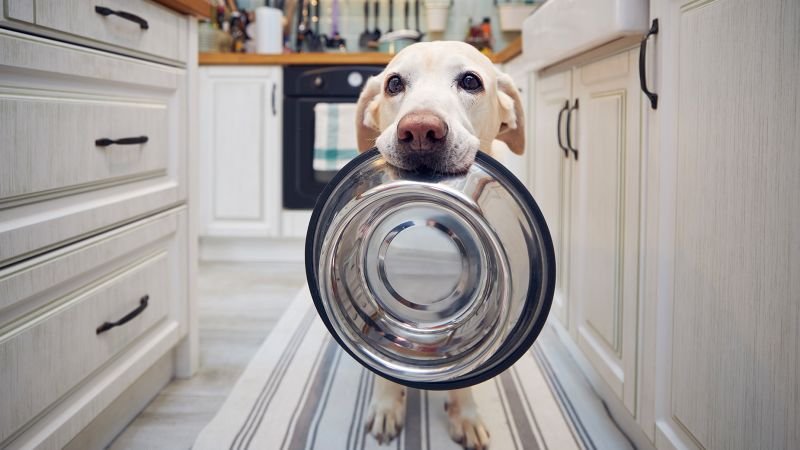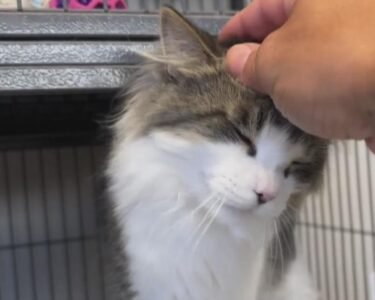Chalabala/iStockphoto/Getty Images
You can make changes to your pet’s routine so they aren’t waking you up too early when the time changes, experts said.
Sign up for CNN’s Sleep, But Better newsletter series. Our seven-part guide has helpful hints to achieve better sleep.
CNN
—
Every night at 11 p.m. sharp, my dog corrals me into my bedroom, and then at 7 a.m. he has his nose in my face ready to start the day — which might be a problem come Daylight Saving Time.
When the clocks spring forward an hour on March 10, I will know that Milo and I have to make adjustments to the routine, but he will not.
And that can be a bigger problem than it seems. Although only shifting by one hour, the switch to Daylight Saving Time can significantly impact our circadian rhythms, sleep expert Dr. Rajkumar Dasgupta said in a previous article. Dasgupta is an associate professor of clinical medicine at Huntington Health in Pasadena, California.
Fortunately, there are ways to make the transition a little easier for your cats and dogs — and in turn, yourself.
The shift to Daylight Saving Time shouldn’t be an issue at all for your cat because certified feline behavior experts Linda Hall and Rita Reimers of the Cat Behavior Alliance recommend not having Fluffy on a schedule to begin with.
Since domesticated cats depend on their people to eat, a cat that normally eats at 7 a.m. is going to start getting very concerned if 7:05 rolls around and the food bowl is empty, Hall said.
Instead, Hall and Reimers recommend using behavioral routines and phrases to indicate that food is coming. And make sure that feeding isn’t the first thing you do in the morning, or else you will have a feline friend pestering you every time you get up in the night, Reimers added.
Hall always plays with her cats for a few minutes before feeding, and now they know not to panic for food if playtime hasn’t come yet. Reimers asks her cats “something to eat?” and that phrase means they can get excited for breakfast.
In the wild, cats typically hunt at dusk and dawn, so that is likely when they will be the most active. If you don’t want to be woken up by a playful cat at dawn, Hall recommends putting toys and enrichment activities around the house before going to bed at night so your pet has something to do before you wake up.
Dr. Jerry Klein has two dogs, a brother-and-sister pair. One is easygoing, and the other is a canine alarm clock, he said.
“Literally, 6:25 in the morning … Zane will be there ready to go,” said Klein, chief veterinary officer of the American Kennel Club.
How strict your dog sticks to the morning routine will depend on their personality, but hunting and sporting dogs might be a little more primed to be up and raring to go, Klein said.
“They hunt in the early morning hours,” he added. “Dogs are usually as a group much more active in the early morning hours because in nature, they do the hunt in the morning.”
You might not be willing to make your morning hunt in the kitchen for their food bowl an hour earlier, in which case you can start making adjustments for your dog now.
“The biggest thing is to stick to a schedule and be pretty firm about it,” Klein said.
Then, you can inch your schedule back or forward by 15 minutes every day to adjust when your dog thinks all their favorite activities will happen — like when they eat, go outside, take a walk or even when the water bowl is done for the night, he added.
Similar to the incremental transition that experts recommend for children, easing your furry friends into a change of a few minutes at a time over the course of several days will be more doable than an abrupt one-hour overhaul.
If you have a younger dog — especially one working on house-training — it is important to put a little more thought and patience into the time change.
“You have to be more sensitive to their cues because they can’t hold it like older dogs can,” Klein said.
To set up a puppy in training for success, adjust the timing of the last trip outside for the day, along with how late you’d like your pet to sleep in, so that the pooch isn’t holding its bladder for an hour longer, he said.
Because unlike older dogs, often puppies just can’t wait that much longer, Klein said.
Even if you don’t get ahead of the time change early enough and you find an animal pawing at your face an hour before you’d like them to, that should be resolved in a couple of days, Klein said.
“The good news is, most pets — dogs primarily — adjust pretty well,” Klein said. “They take their cues from our behavior, and then that becomes ingrained into their behavior.”
Wild animals operate by the sun, but domesticated animals set their clocks to us, and they can make the changes they need to make life work well for them, he said.
“Nature is pretty smart,” Klein said.




